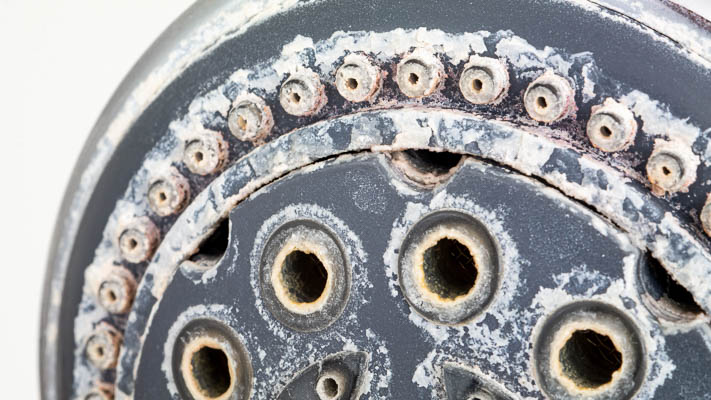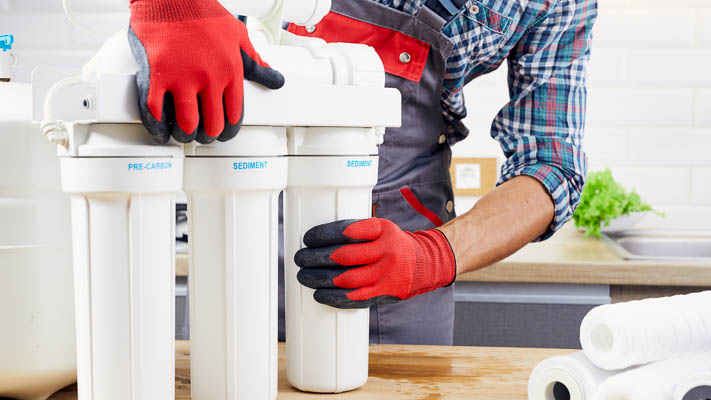What Are Common Water Contaminants?
Water isn't always as pure as it looks. Here are some common contaminants you might find in your water:
- Iron and manganese: These minerals can cause staining on sinks, tubs, and fixtures, often leaving yellow, brown, or reddish marks. They can also give water a metallic taste and may create an unpleasant odor, affecting both drinking and cooking water.
- Chlorine: Widely used by municipalities to disinfect drinking water, chlorine can leave a noticeable taste and odor. Although it helps control harmful bacteria, too much chlorine can make water taste or smell like a swimming pool and may irritate sensitive skin and eyes.
- Sediments: Tiny particles of sand, dirt, and silt may enter the water supply from natural erosion or construction near water sources. These particles not only cloud water but can also damage appliances over time, leading to clogs or buildup in fixtures and pipes.
- Heavy metals and other pollutants: Contaminants like lead, arsenic, and mercury may seep into water from industrial waste or agricultural runoff. Even in small amounts, these pollutants can be harmful to health and may have long-term effects, particularly if ingested over a prolonged period. We have an article that details the key information you need to know about lead pipes.
- Minerals: Calcium and magnesium are the primary contributors to hard water, leading to limescale buildup in pipes and appliances. Hard water affects over 85% of American homes, causing issues like reduced soap lather, scale deposits, and decreased appliance efficiency. Of all water contaminants, these minerals are among the most common and can lead to costly plumbing issues over time.
Understanding what's in your water can help you make an informed decision about treatment options, including whether a water softener is right for your home.
What Does a Water Softener Do?
A water softener removes minerals from hard water, making it "soft." The primary function of a water softener is to prevent the buildup of limescale, which occurs when calcium and magnesium deposits accumulate in your plumbing. The softening process typically involves ion exchange, in which these hard minerals are replaced with sodium or potassium ions.
Here are the main types of water softeners:
- Salt-based ion exchange softeners: These are the most common and work by using a salt brine tank to remove calcium and magnesium ions from hard water. In their place, sodium ions are introduced, effectively softening the water. These systems, such as Spring Well's Salt-Based Water Softener System, are ideal for areas with high levels of hard water, such as parts of Texas and Arizona, where they help prevent scale buildup in pipes and appliances like dishwashers and water heaters.
- Salt-free water conditioners: These systems use a different process, such as a filter or Template Assisted Crystallization (TAC), to reduce scale buildup. They don't remove minerals entirely but rather alter their structure to prevent them from forming deposits. These systems, like Aquasana's Salt-Free Water Conditioner, are effective for areas with mild to moderate hard water, such as parts of the Pacific Northwest, where softening is needed but a full ion exchange isn't necessary.
- Potassium-based systems: These operate like salt-based softeners but use potassium chloride instead of sodium. Potassium is ideal for households looking to avoid the extra sodium in their water, making it a better option for those on low-sodium diets.
Using a water softener improves soap efficiency, leaves skin and hair feeling softer, and helps appliances like dishwashers and water heaters operate more efficiently. Selecting the right system depends on your home's water needs and budget.
What Are the Disadvantages of a Water Softener?
While water softeners provide many benefits, there are a few drawbacks to consider.
One of the main disadvantages is that salt-based water softeners require ongoing maintenance. Homeowners must regularly add salt to keep the system running smoothly, which can be both a hassle and an added expense over time. Additionally, these systems produce wastewater during the ion exchange process, which may not be ideal for those looking to reduce their environmental impact.
Water softeners don't eliminate all possible water contaminants, and they don't remove damage that has already been caused to your pipes. If your water supply contains chlorine, sediment, or heavy metals, you may need to add a filtration system for comprehensive water treatment.

It's also important to note that while water softeners help prevent future mineral buildup, they don't clean pipes that are already damaged. If your plumbing has already suffered from limescale or corrosion due to hard water, simply installing a softener won't fix the existing issues.
In these cases, repiping may be necessary to fully address the damage and restore your plumbing system to optimal condition. Contact us to receive a free fixed-price repipe quote from one of our local repipe consultants.
Get your free estimate today
With over 75,000 repipes completed, we've perfected our One-Stop Repipe™ for your home.
Should I Combine a Water Softener With a Repipe?
Water softeners are effective at preventing mineral buildup in your pipes, but they're most beneficial when combined with a full home repipe, especially if your pipes have already been damaged by hard water.
If your plumbing has been affected by scale or corrosion, a softener won't fix existing issues like clogs, low water pressure, or reduced water flow. A repipe replaces damaged pipes, restoring water pressure and efficiency.
PEX is an ideal material for repiping, particularly in areas with hard water. It resists corrosion and mineral buildup and is more resistant to scale than other materials like copper, making it a long-term solution. PEX is also flexible, easy to install, and cost-effective, ensuring your plumbing system stays in top condition.
A combined approach of repiping and adding a water softener is ideal for homeowners seeking a long-term solution to hard water issues. This ensures that both existing damage is addressed and future damage is prevented, providing peace of mind for years to come.
Get a Quote for Repiping Your Pipes Damaged by Hard Water
Here at Repipe Specialists, we've fully replaced plumbing in thousands of homes across the USA with modern Uponor PEX tubing. We continually get positive customer feedback from customers about their whole home repipe experiences. We often exceed their expectations on:
- Speed: Our repipe crews typically complete a repipe in a day, returning on another day for wall patching.
- Convenience: Through our One-Stop Repipe™ Process, we handle everything from permits, to wall patching, to inspections.
- Cleanliness: Our crews are trained to protect your home while working (we cover all surfaces with protective sheeting), and to clean up fully at the end of each day.
- Peace of Mind: Repipe Specialists is a fully licensed plumber in every state we operate in, and we back all of our repipes with a lifetime warranty.
- Financing programs: To help take the sting out of unplanned repipe expenses, we offer several financing programs.
- Price: As a specialist that performs hundreds of repipes a week, we can deliver high-quality repipes at a lower cost vs generalist plumbers. Our quotes typically range from $4,500 to $15,000 depending on the size and complexity of your project. We have an article that covers repipe cost factors in detail.
Schedule a free in-home consult, and one of our local repipe consultants will explain all your repipe options and provide you with a written, fixed-price quote. Permanently fix water contaminants, combine a water softener with a repipe.

